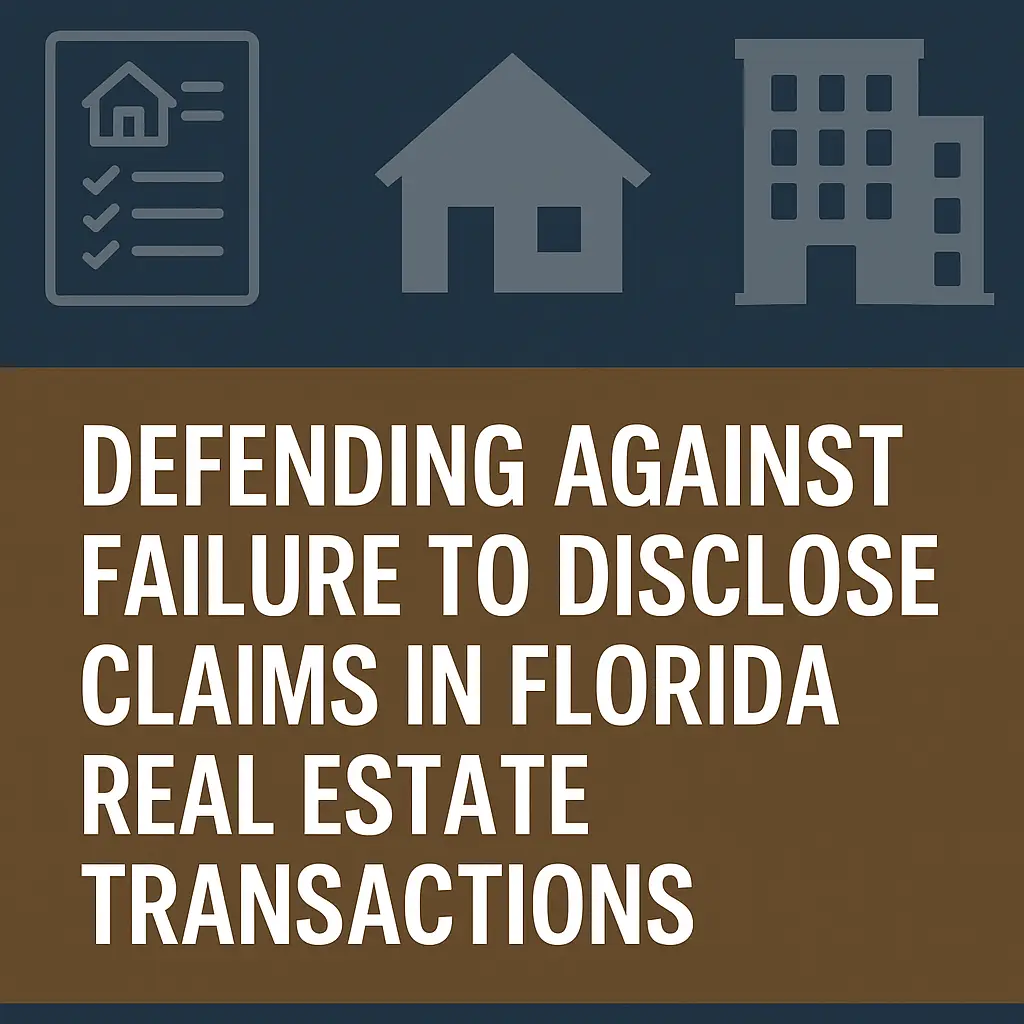Selling Property in Florida and Facing a “Failure to Disclose” Claim?
You sold your home or condominium in Florida, only to receive a letter from the buyer — or their attorney — accusing you of failing to disclose problems with the property. These failure to disclose claims are stressful, especially when you acted honestly and complied with your obligations.
Whether the sale involved a single-family home, condominium unit, townhome, or investment property, understanding your legal rights is critical before responding.
Florida’s Seller Disclosure Rule
Most Florida real estate sales are completed using the FAR/BAR “AS IS” Residential Contract for Sale and Purchase. Under Paragraph 10(j):
“Seller knows of no facts materially affecting the value of the Real Property which are not readily observable and which have not been disclosed to Buyer.”
This means:
- You must disclose only facts you actually know;
- That materially affect the value of the property;
- And that are not readily observable by the buyer.
This is not a guarantee that no future problems will arise. It’s a duty to disclose known, non-observable defects at the time of sale.
Condominium Sellers: Understanding Common Element Issues
If you sold a condominium, the Condominium Rider to the FAR/BAR contract makes it clear — you are responsible for disclosing issues within your unit. You are not responsible for the building’s common elements (roof, balconies, structural supports, plumbing risers, etc.) unless you had actual knowledge of a material defect affecting your unit.
This distinction is important because many buyer complaints involve association-maintained areas or recertification repairs — matters outside your disclosure obligations.
Why Disputes Often Arise After Closing
It’s common for a condominium association or homeowners’ association to:
- Begin a 40-year recertification or major capital repair project after closing;
- Hire engineers or contractors who discover hidden structural or safety issues;
- Expand the scope of repairs once work begins.
These discoveries sometimes lead buyers to wrongly assume the seller knew about the issues beforehand. In reality, many sellers have no way to know about latent conditions that are uncovered only after professional inspections and construction work.
Why You Must Respond to a Demand Letter
If you receive a demand letter, do not ignore it. Demand letters are often the first step toward litigation, and silence can be spun as an admission or lack of cooperation.
An attorney can help you:
- Deny unfounded allegations while preserving your rights;
- Correct factual errors in the letter;
- Avoid statements that could be taken out of context and used against you.
Checklist: Documents to Gather Immediately
Having the right documentation in hand allows your attorney to respond quickly and effectively. Gather:
- Sales Contract (including all riders and addenda);
- Seller’s Property Disclosure Form (if used);
- Closing statement and settlement documents;
- Any inspection reports obtained before or during your ownership;
- Emails or letters from the condo/HOA during your ownership;
- Special assessment records and proof of payment;
- Permits and final inspections for work done during your ownership;
- Communications with buyer or their agent (emails, texts, letters);
- Photos or videos of the property at or near closing;
- Engineering or contractor reports in your possession before sale.
Our Defense Strategy
At Andrew Douglas, P.A., we defend Florida sellers against failure to disclose claims by:
- Showing the seller complied with all contractual disclosure obligations;
- Proving alleged defects were either disclosed, obvious, or part of the buyer’s due diligence;
- Demonstrating conditions were discovered only after closing and could not have been known by the seller;
- Leveraging contract provisions — including mediation clauses and attorneys’ fees provisions — to protect clients and discourage frivolous claims.
Protect Your Rights Now
If you’ve been accused of failing to disclose defects in a Florida real estate transaction — whether for a home, condominium, or investment property — contact Andrew Douglas, P.A. immediately.
📞 Call: 954.474.4420
📧 Email: andrew@douglasfirm.com
We represent sellers across Florida and will help you respond strategically, protect your legal rights, and position you for the strongest defense possible.

